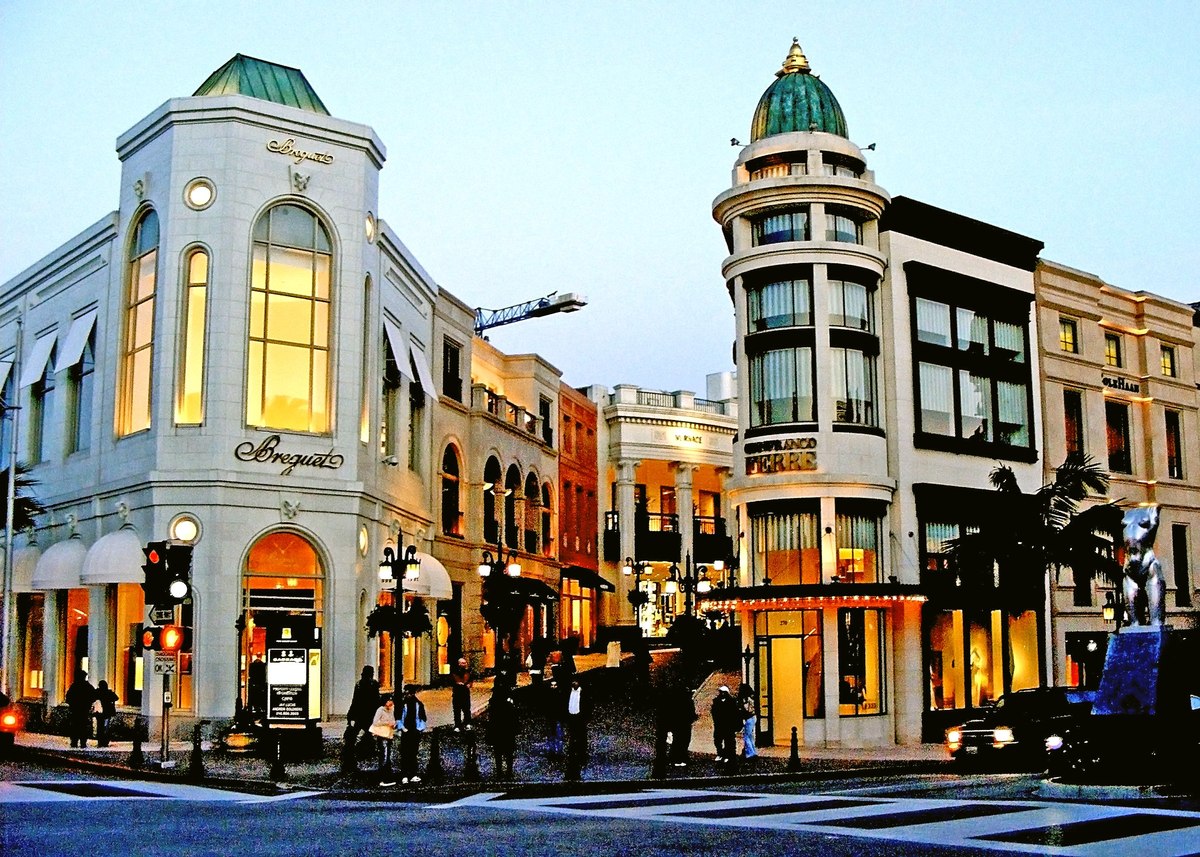Overall spending is up 8.7%; online sales outpace in-store purchases while charitable giving and “self-gifting” are on the rise.
Holiday spending is expected to be strong this year, according to the Survey of Affluence and Wealth, published by Time Inc. and YouGov. Results of a national survey of holiday spending plans among America’s households – and a separate survey of affluent and wealthy households – suggests that the average U.S. family will spend $736 on gifts this year, an increase of $66 per household. This equates to a total U.S. holiday gift spend of $77.5 billion, an 8.7% increase over an estimated $71.3 billion in 2013.
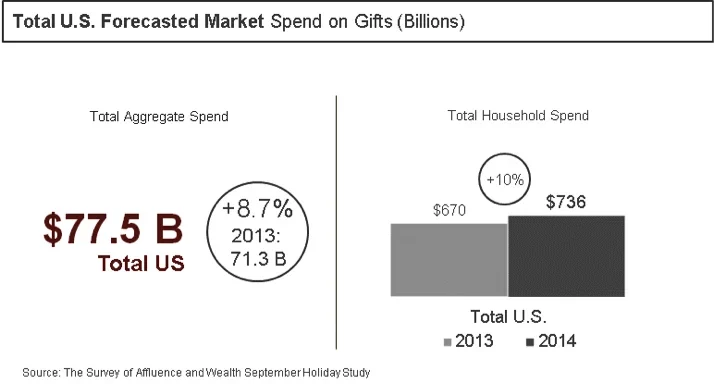
Results also show a significant increase in purchases by the nation’s most successful consumers. Among the top 10%, average spending will increase 8%, to $1,920 per family. In line with this trend, Upper Middle Class families ($125,000-$150,000 HH incomes) plan to spend 32% more this holiday season than last; and One Percenter families ($450,000 HH incomes), an additional 29%. Affluent families ($150,000-$450,000 HH incomes) are trending down around 10%, roughly in line with the spending increase among these families last year.
The study also found that the top ten percent of Americans will account for $21.6 billion of purchases – nearly one-third (30%) of all U.S. holiday gift-giving. Among American families not included in the top 10% (i.e., general population households that account for 90% of the U.S. population), spending is estimated to be up 12%, for an average of $594 per family.
According to Dr. Jim Taylor, Vice-Chairman of YouGov America, “This is the first really robust holiday season since the dark days of the recession. However, it is important to note that most Americans – especially affluent Americans – still believe we are in a recession. They remain concerned about the state of the American economy and community. While most affluent families concede significant improvement in their household finances, concerns remain that the overall economy is unstable and that problems of war, disease and civil unrest persist globally.”
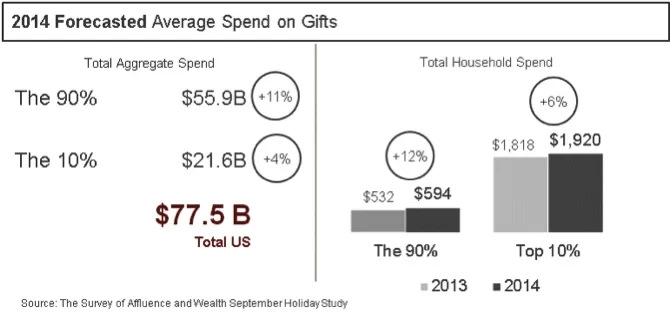
Beyond increased spending, holiday shopping patterns continue to evolve. Caryn Klein, Vice President of Time Inc. Research & Insights, commented, “Shopping continues to shift in favor of digital as the gap between online and in-store shopping is now the largest it’s been in the past four years.”
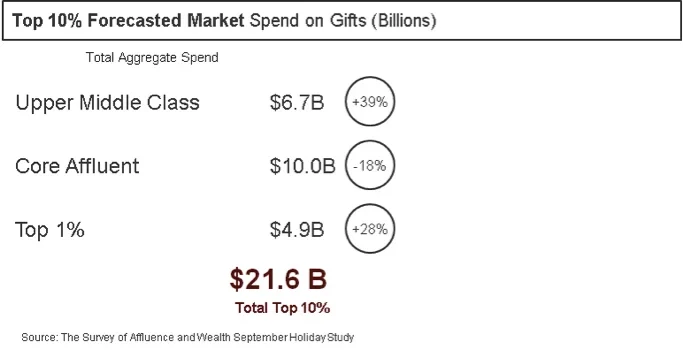
Forty-five percent of affluent holiday shoppers expect to do most or all of their shopping on-line while 35 % intend to shop mostly in stores. The remaining 24% of affluent shoppers will mix it up, using both digital and brick-and-mortar establishments for their holiday gift-giving.
Perhaps equally important is the dramatic rise of the smartphone as a shopping assistant.
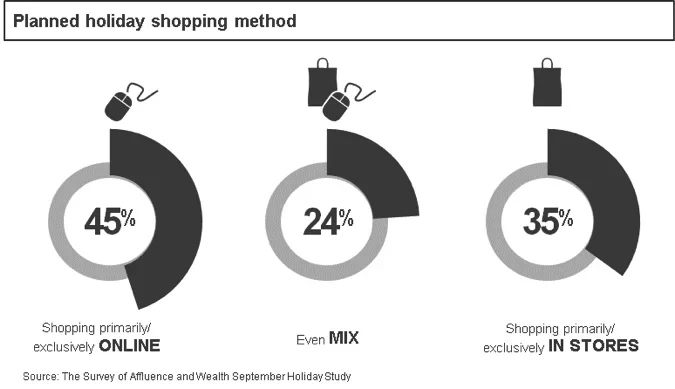
“Fifty-five percent of holiday shoppers, especially women, expect to use their phones to compare prices, features, colors and overall product value and worth,” said Cara David, Managing Partner at YouGov. “Projected usage of smartphones for shopping has increased 33% over 2013.”
Once again, gift cards lead the Survey’s list of the top five holiday gifts for 2014. Fashion will continue to be a popular gift item, as will books, while watches are especially prized by men. This year will see strong growth in sales of both food and fine jewelry as well, the latter category being generally viewed as an “earned asset.” It seems that 2014 will be the year of significant recovery for the jewelry industry, which suffered markedly during the recession.
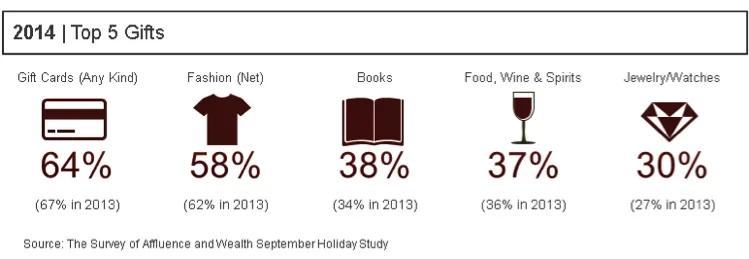
Another phenomenon that has grown substantially over the last five years is holiday shopping for oneself.
“We believe men and women feel the need to reward themselves for their hard work at keeping their lives together during the difficult recessionary years,” Dr. Taylor observed. “This trend is particularly strong among parents with children under the age of 18. Forty-five percent of these holiday shoppers expect to indulge themselves with a personal purchase. Shopping for family and friends will increase by 25% over 2012 and 17%, as compared to last year.”

Self-gifting among parents with youngsters comes in the form of jewelry, food and wine, cosmetics, smartphones and art. At a level almost equal to the percentage of families investing in art is the substantial increase in the number of these parents who expect to donate to a charity as a gift to themselves. More than doubling from 5% to 11%, the gift of charity now represents a wonderful way for parents to feel good about the accomplishments of their successful families and, at the same time, express their sense of obligation to their community. It seems that the reward for doing well with the kids this year is a genuine reward.
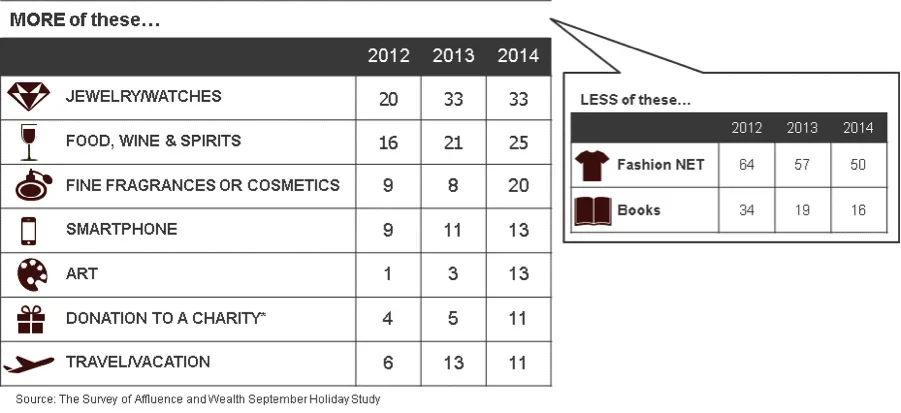
In addition, the holiday season promises to be good for spouses and significant others. Even as shoppers reward themselves, they intend to splurge on their loved ones. Among affluent households with children under 18, more than one in five respondents (21%) intends to spoil a significant other, an increase of 60% over 2013.
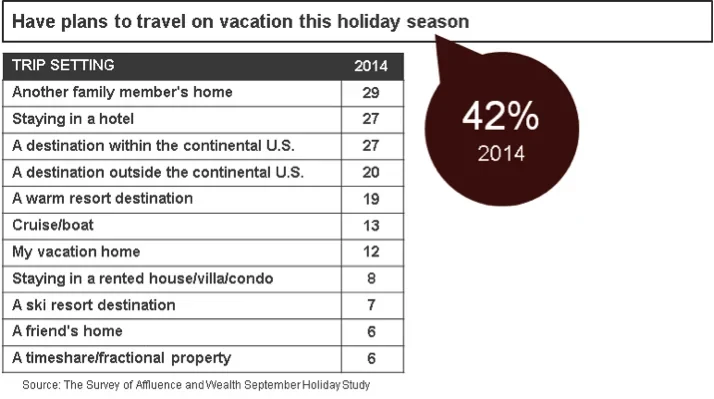
In addition, travel plays an important role in holiday planning. Forty-two percent of affluent families expect to travel this year – the most common destination being a relative’s home. In general, travel has been the fastest growing consumer category since the recession and this holiday season will be no exception. Families no longer regard travel as a discretionary category, but rather, as a necessity. Respondents stated that travel is the key to a fulfilled life, giving the family unencumbered “together” time.
In sum, 2014 promises to be an exceptional holiday season. Three out of four (75%) respondents anticipate it to be a time of joy for themselves and their loved ones. While spending is projected to be up, purchases will continue to underscore the meaning of the relationship between giver and receiver. Smartphones enable more careful purchasing, while online shopping provides added convenience for many shoppers. Travel is a big part of the 2014 holiday season.
Above all, however, the most important part of affluent holiday shopping is the spirit of the holidays. Successful families strive for fulfillment by de-emphasizing the importance of possessions and stressing the significance of families working together to manage risk and achieve happiness in an uncertain world.
